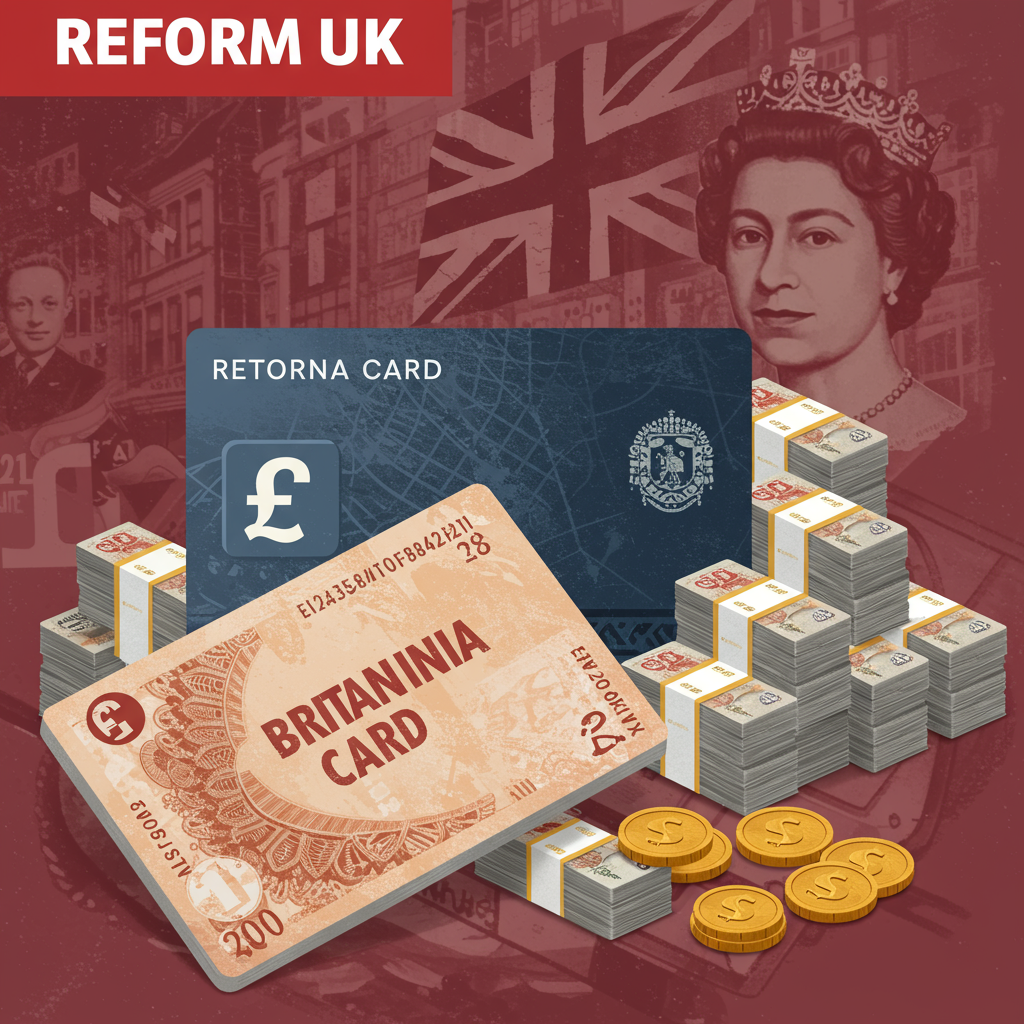Reform UK has unveiled a controversial proposal for wealthy individuals residing in the UK but with their permanent home abroad – known as non-domiciled individuals, or non-doms. The plan would allow non-doms to pay a significant upfront fee to avoid certain UK taxes, a move the party claims will attract global talent and generate revenue for low-paid workers, but which critics brand a “tax cut for foreign billionaires.”
What is the Reform UK Non-Dom Proposal?
Under Reform UK’s policy, non-doms would pay a one-off fee of £250,000 to obtain a “Britannia Card.” This card, renewable every 10 years without further charge, would grant the holder exemption from UK tax on their wealth, income, and capital gains earned outside the UK. Crucially, it would also exempt them from UK inheritance tax.
The current system allows non-doms to avoid UK tax on foreign income and assets unless they bring that money into the UK. Previously, non-doms residing in the UK for extended periods paid an annual fee (£30,000 or £60,000) to maintain this status. HMRC figures show around 74,000 people claimed non-dom status in 2022-23. Labour had recently announced plans to abolish the non-dom status entirely, forecasting their replacement package would raise £33.8 billion over five years, though those plans are reportedly being softened following concerns from the non-dom community and reports of wealthy individuals leaving the UK.
Reform’s Rationale and Revenue Promise
Reform UK leader Nigel Farage argues the policy is designed to make the UK an attractive destination for “tens of thousands” of talented entrepreneurs, risk-takers, job creators, and high taxpayers who might otherwise leave or not consider the UK. He suggests the initial £250,000 fee is just the start, expecting these wealthy individuals to contribute significantly more through UK taxes like stamp duty on property purchases and VAT on spending.
The party estimates its “Britannia Card” policy could generate between £1.5 billion and £2.5 billion annually. Reform UK pledges to transfer this entire amount, tax-free, each year directly into the bank accounts of the lowest 10% of full-time workers. They project this could amount to between £600 and £1,000 per eligible low-paid worker per year. Farage acknowledged concerns about potentially pushing up property prices in London but claimed it wouldn’t impact the cost of affordable housing.
Critics Warn of “Fantasy Economics” and Revenue Loss
The proposal has faced sharp criticism from across the political spectrum and from tax experts.
Labour’s Opposition: Labour’s Shadow Chancellor, Rachel Reeves, labelled the policy a “tax cut for foreign billionaires” and a “golden ticket” for the wealthy to avoid tax. A Labour spokesperson warned that such a giveaway would reduce revenues from the rich, which would then have to be compensated for through tax increases on working families or cuts to public services like the NHS.
Expert Skepticism: The Institute for Fiscal Studies (IFS) think tank expressed significant doubt that the measure would raise net money for the Treasury. IFS senior economist Stuart Adam explained that for non-doms who would have paid tax on their foreign income anyway, the Treasury would lose that revenue – potentially far more than the £250,000 fee they might pay to avoid it. Adam also raised concerns that distributing funds to the “lowest 10% of full-time workers” might exclude genuinely low-income households where no one is in full-time employment.
Significant Revenue Loss Predicted: Dan Neidle, founder of Tax Policy Associates, estimated the policy could lead to a staggering £34 billion loss in government revenue over five years, citing figures from the Office for Budget Responsibility (OBR). He also warned that the high £250,000 fee could deter highly-skilled foreign professionals unable to afford it, potentially forcing them into a position of facing full UK tax on top of taxes in their home country under Reform’s system. Neidle also suggested that wealthy individuals might hesitate to pay the large upfront fee if they doubt the policy’s long-term stability.
Conservative Dismissal: Conservative Shadow Chancellor Mel Stride dismissed Reform’s proposal as “fantasy economics” and “ruinously irresponsible.”
- Broader Economic Concerns: The policy also fits into a broader pattern of Reform UK’s economic proposals that have drawn fire. Labour leader Keir Starmer has directly compared Reform’s overall approach to the unfunded tax cuts of former Prime Minister Liz Truss, warning that such plans could “crash the economy.”
- www.bbc.com
- www.aol.com
- www.bbc.com
- www.bbc.com
- www.bbc.com
While Reform UK promotes its Britannia Card as a way to attract wealth and help the lowest paid, critics argue it’s a costly tax break for the very rich that could significantly damage the UK’s tax base and economic stability, contrasting sharply with current government efforts and expert analysis. The debate over how best to tax international residents and whether to prioritise attracting wealthy individuals with tax breaks or ensuring fairness and higher overall revenue remains a central point of contention in UK tax policy discussions.




